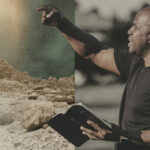Everyone who opens a Bible for the first time does so with a worldview in place. We begin reading with a set of values and presuppositions imbibed from family, teachers, authors, movies, and other cultural sources of information.

Given that our perspectives are geographically situated, it’s no surprise the worldview and approach to Scripture in the Global South is different from the Global North. From the Enlightenment onward, many in the West—including Christians—learned to separate the natural from the supernatural. This left us with a divided Christianity to the point that, according to the book Understanding Folk Religion, “Most missionaries taught Christianity as the answer to the ultimate and eternal questions of life, and science based on reason as the answer to the problems of this world.”
Subtraction vs. Addition
In the West, the main problem has often been liberalism—subtracting from God’s revelation. The ultimate expression of this is found in German theologian Rudolf Bultmann (1884–1976), who wished to strip away the Bible’s supernatural elements. But in the Global South, where I live and pastor, our main problem hasn’t been liberalism; it’s been heresy—adding to biblical revelation. Many of these “additions” have come to us through mystical experiences such as visions and dreams.
In the West, the main problem has often been liberalism—subtracting from God’s revelation. But in the Global South, our main problem has been heresy—adding to God’s revelation.
Rationalism in the West says, “Man has the authority to remove from God’s revelation.” But mysticism in the Global South says, “Man has the authority to add to God’s revelation.” For the Western rationalist, the dominant worldview is modernity or postmodernity. But for a large percentage of the Global South, the dominant worldview is animism.
Awash with Animism
The intersection between Christianity and animism has perverted orthodox Christianity in the South. These two worldviews have too often fused rather than clashed, creating a syncretistic alternative. Questions about the finality of the biblical canon abound; so too do questions about its authority.
Dismantling these issues is a subset of Christians discipleship. Converted animists cease believing the lies communicated by evil spirits; however, as brand-new Christians they often maintain their belief that God frequently speaks through angels, divine apparitions, dreams, visions, and other revelations contradictory to the Word of God. The narrations of these experiences have become the norm in many worship services, prayer gatherings, and “revival” meetings. Quite often these experiences offer nothing more than syncretistic religion—heterodoxy resulting from the clash between their old animistic worldview and their new biblical one.
God’s special revelation isn’t denied in the South; it’s “supplemented,” even among those claiming to be evangelicals. They attempt to “Christianize” their former beliefs and practices. This is why there are numerous “evangelical superstitions” in the Global South.
You could say the challenge doesn’t come through the front door of biblical inerrancy but the back door of extrabiblical revelation.
So what does this all mean? For those of us who minister in the South, the challenge usually isn’t to persuade people God has revealed himself, but to convince them Scripture is his complete and final revelation. You could say the challenge doesn’t come through the front door of biblical inerrancy, but through the back door of extrabiblical revelation. The doctrines of divine revelation and biblical authority—as well as the belief in a complete canon—are fundamental in a land inundated with “prophets” and “apostles.”
Contrasting Views of Authority
In the Global South, the authority of God’s Word has been compromised in both Roman Catholic and also evangelical circles. The Catholic Church goes so far as to say:
It is clear therefore that, in the supremely wise arrangement of God, sacred Tradition, Sacred Scripture, and the Magisterium of the Church are so connected and associated that one of them cannot stand without the others. Working together, each in its own way, under the action of the one Holy Spirit, they all contribute effectively to the salvation of souls. (Catechism of the Catholic Church, Article 95)
In the secular West, ultimate authority lies in the reasoning of the individual; in the Catholic South, authority lies in the reasoning of the church.
In the secular West, ultimate authority lies in the reasoning of the individual; in the Catholic South, authority lies in the reasoning of the church.
Here’s a taste of how the concept of authority plays out quite frequently in the Global South. The first two are most common:
- Animists think there are “spiritual beings” or entities that have power and authority.
- Roman Catholics are taught that, when it comes to spiritual matters, the Bible and church tradition share authority.
- Modernists believe science has supreme authority.
- Evangelicals believe Scripture has supreme authority.
Philip Jenkins classifies the Christian Global South as conservative and fundamentalist in general. That might be true at one level, but many of those who acknowledge Scripture as the supreme authority also believe the latest extrabiblical declaration made by an “apostle” or “prophet” who recently visited their congregation. People ruled by dictatorial regimes can easily be convinced of submitting to autocratic leaders with imposing personalities. In many cases, these leaders become the functional supreme authority over believers instead of Christ and his Word.
To remedy this, sola Scriptura must become the battle cry of Latin America’s reformation.
I wrote this short essay in hopes that my Christian brothers in the North would better understand the differences between the two hemispheres. Being better informed will help us better reach the Global South with the gospel, relying on the sovereignty of God and the sufficiency of his Word.
Editors’ note: Sign up to hear Miguel Núñez teach on “Why Latin America Still Needs a Reformation” at The Gospel Coalition 2017 National Conference, April 3 to 5, in Indianapolis. Through November 15, all gifts toward Coalición por el Evangelio will be matched dollar-for-dollar up to $100,000. To learn more about Coalición por el Evangelio, see their 2016 Ministry Report.
Ways to give:
1. Online. Click here to donate.
2. By Check. Checks can be made out to “The Gospel Coalition” with “Coalición – Spanish” in the subject line.
The Gospel Coalition
Office of Advancement
P.O. Box 583542
Minneapolis, MN 55458-3542
Free eBook by Tim Keller: ‘The Freedom of Self-Forgetfulness’
 Imagine a life where you don’t feel inadequate, easily offended, desperate to prove yourself, or endlessly preoccupied with how you look to others. Imagine relishing, not resenting, the success of others. Living this way isn’t far-fetched. It’s actually guaranteed to believers, as they learn to receive God’s approval, rather than striving to earn it.
Imagine a life where you don’t feel inadequate, easily offended, desperate to prove yourself, or endlessly preoccupied with how you look to others. Imagine relishing, not resenting, the success of others. Living this way isn’t far-fetched. It’s actually guaranteed to believers, as they learn to receive God’s approval, rather than striving to earn it.
In Tim Keller’s short ebook, The Freedom of Self-Forgetfulness: The Path To True Christian Joy, he explains how to overcome the toxic tendencies of our age一not by diluting biblical truth or denying our differences一but by rooting our identity in Christ.
TGC is offering this Keller resource for free, so you can discover the “blessed rest” that only self-forgetfulness brings.


































